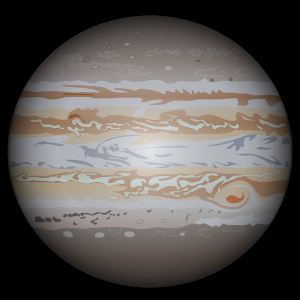


Jupiter is the fifth planet from the Sun and the largest planet in the solar system. Jupiter is the third-brightest object in the night sky, after the Moon and Venus, and can be seen with the naked eye. Jupiter was named after the Roman god of the same name.
| Jupiter | Earth | |
|---|---|---|
| Type of Planet | Gas Giant | Terrestrial |
| Moons | Io, Europa, Ganymede, Callisto, and at least 63 others | The Moon |
| Rings | Rings of Jupiter | None |
| Mass | 1.899 × 1027 kg | 5.972 × 1024 kg |
| Volume | 1.431 × 1015 km3 | 1,083,000,000,000 km3 |
| Closest Distance to Sun | 740,600,000 km | 147,100,000 km |
| Furthest Distance from Sun | 816,500,000 km | 152,100,000 km |
| Average Orbital Speed | 47,050 kph | 107,200 kph |
Of Jupiter's moons discovered so far, 55 of them are less than 5 km in diameter, or about 15.7 km in circumference. Assuming 15 minutes per km, and of course ignoring the effects of gravity (and the fact that there wouldn't be any air) a person could walk around one of these moons in about 235.5 minutes— just under 4 hours.
With a mass of 1.899 × 1027, Jupiter has the mass of about 318 planet Earths, or twice the mass of all of the other planets, combined.
Jupiter is, by far, the largest planet in the solar system. It has a diameter 11 times larger than the Earth, and could fit just about 1,317 Earths inside of it, by volume. Saturn, the runner up, has about half this volume.
Because Jupiter is so massive, it has a much stronger gravitational pull than Earth. You'd weigh just over 2.5 times your Earth weight on Jupiter.